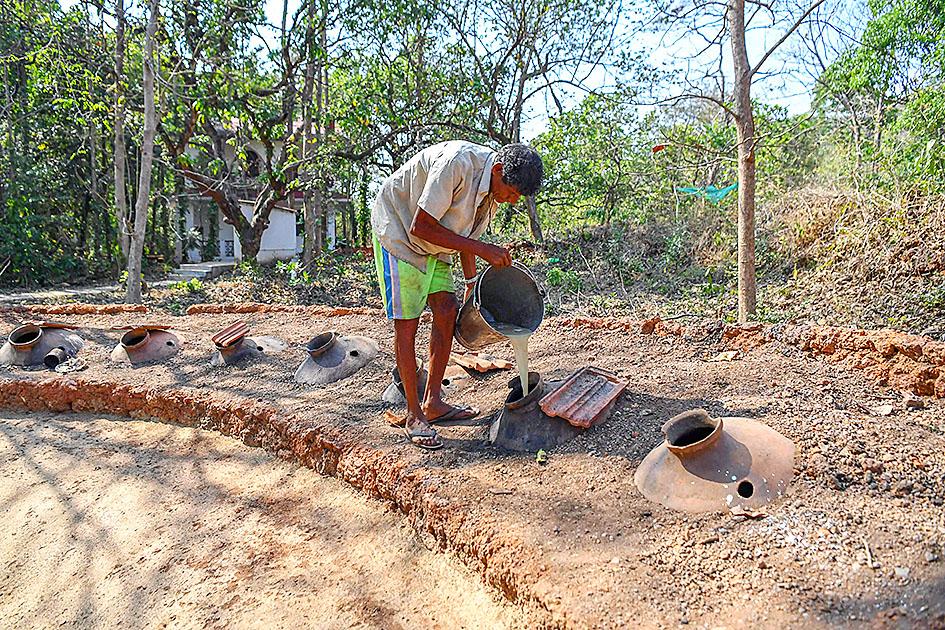Five centuries after Goans began making feni — a pungent, fermented liquor not for the faint-hearted — a new crop of distillers is hoping to take the spirit global.
But first, they have to convince other Indians to drink it.
Usually made from crushed cashew apples or coconut palm sap, the potent beverage has in recent decades fallen out of favor in Goa — a former Portuguese colony south of Mumbai — with the arrival of foreign liquor brands.

Photo: AFP
“I wanted to translate traditional knowledge for a modern audience,” said Hansel Vaz, whose Cazulo distillery uses centuries-old techniques to make feni while inventing cocktails that are easy on the nose and smooth on the palate.
Production is limited to the cashew apple harvesting season from February to May, with custom dictating that only the fruit that falls to the ground is ripe enough to be used for feni.
While more modern distilleries use metal crushers to extract the juice for fermentation, at Cazulo the cashew apple — its nut removed — is dumped into a stone basin carved into the ground.

Photo: AFP
A barefoot farm worker holds on to ropes and stomps the fruit until the juice is extracted and transferred into underground clay pots.
After three days, the fermented liquid is boiled and distilled. Fresh juice is then added to it for a second round of distillation.
‘RITE OF PASSAGE’
Feni’s strength was traditionally measured by looking at the size of the bubbles formed when it’s poured into a glass.
Today, distillers use alcohol meters or take a sip to infer the quality of the tipple.
The liquor historically played an important role in Goan society, according to Biula Pereira, who has written a book about the spirit first concocted after the Portuguese brought cashews to the colony in the 16th century.
“Feni was used for every occasion, for every rite of passage. It also served a medicinal purpose as a remedy for the common cold and fever,” she said.
Vaz’s grandfather drank it daily, but by the dawn of the 21st century, younger Goans had little appetite for its fiery pleasures.
As he watched gin and mezcal take over the world, Vaz, then a geologist working overseas, felt a compulsion to revive his family business and “make feni cool.”
“It was about expressing our cultural identity,” said the 38-year-old of his ambition to create a market for premium bottled feni made in Goa.
That sense of local pride is at the heart of many feni businesses.
The director of Madame Rosa distillery Mac Vaz — no relation to Hansel — said his mission was to end the “colonial hangover” that prompts some Indians to dismiss local products in favor of imported goods.
But as a teetotaller who only took his first sip of feni aged 23, he realized firsthand that new patrons would need some coaxing to down their drinks.
At Cazulo, guests are invited to watch the feni-making process before sampling the spirit on its own as well as in cocktails with guava juice, lime and other mixers.
The efforts seem to be paying off.
At a recent Madame Rosa tasting session, businesswoman Shamina Shamji, who always steered clear of feni because it was “too sharp, too strong,” warmed to the mango and feni cocktail she was nursing.
“I would definitely order this at a bar,” the 50-year-old said.
‘COUNTRY LIQUOR’
Goan brands are looking to tap a growing market of cosmopolitan and adventurous Indians.
Madame Rosa already exports to eight countries, including the US, Australia and the United Arab Emirates.
They produce up to 5,000 cases of feni a year under multiple brand names, with each bottle costing up to 1,500 rupees (US$20).
But national regulations make it difficult for feni to be sold outside the state because the spirit is officially classified as “country liquor.”
Many Indians also associate that designation with illegally-brewed alcohol that lands people in hospital — a marketing nightmare for feni producers.
Others warn that rapid expansion could dilute the very essence of feni they are trying to preserve.
“It’s not about slapping on a fancy label and making a quick buck,” said Hansel Vaz of Cazulo, which has exported to North America, Southeast Asia and Europe.
“It is a traditional craft. You can’t mass-produce it.”

In late October of 1873 the government of Japan decided against sending a military expedition to Korea to force that nation to open trade relations. Across the government supporters of the expedition resigned immediately. The spectacle of revolt by disaffected samurai began to loom over Japanese politics. In January of 1874 disaffected samurai attacked a senior minister in Tokyo. A month later, a group of pro-Korea expedition and anti-foreign elements from Saga prefecture in Kyushu revolted, driven in part by high food prices stemming from poor harvests. Their leader, according to Edward Drea’s classic Japan’s Imperial Army, was a samurai

Approaching her mid-30s, Xiong Yidan reckons that most of her friends are on to their second or even third babies. But Xiong has more than a dozen. There is Lucky, the street dog from Bangkok who jumped into a taxi with her and never left. There is Sophie and Ben, sibling geese, who honk from morning to night. Boop and Pan, both goats, are romantically involved. Dumpling the hedgehog enjoys a belly rub from time to time. The list goes on. Xiong nurtures her brood from her 8,000 square meter farm in Chiang Dao, a mountainous district in northern Thailand’s

Located down a sideroad in old Wanhua District (萬華區), Waley Art (水谷藝術) has an established reputation for curating some of the more provocative indie art exhibitions in Taipei. And this month is no exception. Beyond the innocuous facade of a shophouse, the full three stories of the gallery space (including the basement) have been taken over by photographs, installation videos and abstract images courtesy of two creatives who hail from the opposite ends of the earth, Taiwan’s Hsu Yi-ting (許懿婷) and Germany’s Benjamin Janzen. “In 2019, I had an art residency in Europe,” Hsu says. “I met Benjamin in the lobby

April 22 to April 28 The true identity of the mastermind behind the Demon Gang (魔鬼黨) was undoubtedly on the minds of countless schoolchildren in late 1958. In the days leading up to the big reveal, more than 10,000 guesses were sent to Ta Hwa Publishing Co (大華文化社) for a chance to win prizes. The smash success of the comic series Great Battle Against the Demon Gang (大戰魔鬼黨) came as a surprise to author Yeh Hung-chia (葉宏甲), who had long given up on his dream after being jailed for 10 months in 1947 over political cartoons. Protagonist